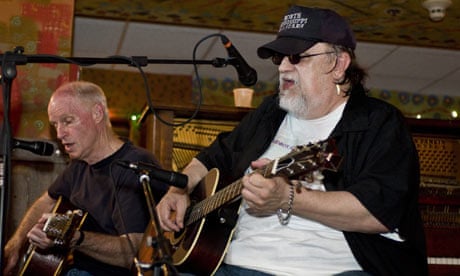Jim Dickinson, who has died aged 67 of heart failure, was a celebrated pianist and record producer in Memphis. He released several solo albums, but his greatest talent lay in helping other artists realise their potential, among them Aretha Franklin, the Rolling Stones, Ry Cooder and Bob Dylan.
Born in Little Rock, Arkansas, Dickinson moved with his family to Memphis in 1948. His mother played the piano at the local Baptist church and gave Jim his first lessons. As a teenager he learnt blues and boogie-woogie piano from Alec Tiel, a black "yard man" his family employed, and formed his first band, the Regents, in 1958. The group played Memphis bars and parties, with Dickinson soaking up all he heard in what was then America's number one music city.
Enrolling at Baylor University in Waco, Texas, Dickinson studied set and stage design but later transferred to Memphis State University and married Mary Lindsay Andrews. In the early 1960s, he ran Memphis's Market Theatre and hoped to make his career in theatre. But his skills as a folk singer found him invited to Nashville in 1964 to sing on the Bill Justis Orchestra album Dixieland Folk Style. The album was a success and Dickinson realised music was his future.
He cut memorable if unsuccessful 45s for Justis and for Sam Phillip's Sun Records and played every session going. He became instrumental in helping Memphis's veteran blues singers get work and was the point of contact for British rock musicians. When the Rolling Stones toured America in 1969 they rang Dickinson to inquire about recording in Memphis. As they lacked the necessary permits, Dickinson suggested they head to Muscle Shoals, an Alabama non-union studio. There Dickinson was invited to play on the sessions that became the group's 1971 album Sticky Fingers; the piano solo on Wild Horses is his.
The Atlantic Records executive Jerry Wexler hired Dickinson and his Memphis alumni – the guitarist Charlie Freeman, bassist Tommy McClure and drummer Sammy Creason – as Atlantic's Miami studio house band. Calling themselves the Dixie Flyers they backed everyone from Franklin to Lulu, but in 1971 the group disintegrated due to Freeman's drug addiction; Dickinson resettled in Memphis. There he finished what was supposed to be the band's Atlantic debut as a solo album. Dixie Fried (1972) was co-produced by Tom Dowd and realised Dickinson's vision of an avant-garde American roots music.
In the early 1970s Cooder hired Dickinson to play on and co-produce (with Lenny Waronker) his acclaimed albums Into the Purple Valley and Boomer's Story. Dickinson also joined Cooder's band for two European tours and worked on Cooder's soundtracks for Southern Comfort (1981), The Border (1982), Paris, Texas (1984), Streets of Fire (1984), Alamo Bay (1985) and Crossroads (1986). A song Dickinson and Cooder co-wrote (with John Hiatt), Across the Borderline, has since become a contemporary standard.
In 1974 Dickinson produced Sister Lovers, an album by the Memphis rock group Big Star. Barely released, Sister Lovers became a cult album and led to Dickinson producing the 1987 album Pleased to Meet Me by the Replacements. The British rock groups Primal Scream and Spiritualized employed Dickinson when they recorded in Memphis in the early 1990s.
Dickinson's enthusiasm, love of the offbeat and willingness to work on low budgets found him producing everyone from reggae icons Toots and the Maytals through Seattle grunge band Mudhoney to Mississippi blues primitive T-Model Ford. In demand as a pianist as well as a producer, Dickinson sought out assignments he found challenging. In 1997 he was hired by Dylan to play on his comeback album Time Out of Mind.
Wary of the Los Angeles music industry, Dickinson remained based in Memphis and was a champion of that city's uniqueness. He occasionally performed and recorded as part of the Memphis rock groups Mud Boy and the Neutrons, Panther Burns and Snake Eyes. Their material reflected Dickinson's desire to blend blues and rock with Antonin Artaud's Theatre of Cruelty theories.
In 1996 Dickinson's sons, Luther and Cody, formed the group the North Mississippi Allstars. They also began playing on their father's sessions – Willy DeVille's 1999 album Horse of a Different Color, produced by Dickinson, is an excellent example of the family at work – and on Dickinson's several solo albums recorded over the past decade, which mixed blues, rock and beat poetics. In the 1990s the Dickinsons set up Zebra Ranch recording complex in Hernando, Mississippi.
Musicians loved Dickinson and his generosity of spirit. When asked to describe his working process, he said: "There's a field of energy that's present when you're making a record, and the producer manipulates that field of energy."
He is survived by his wife and sons.
